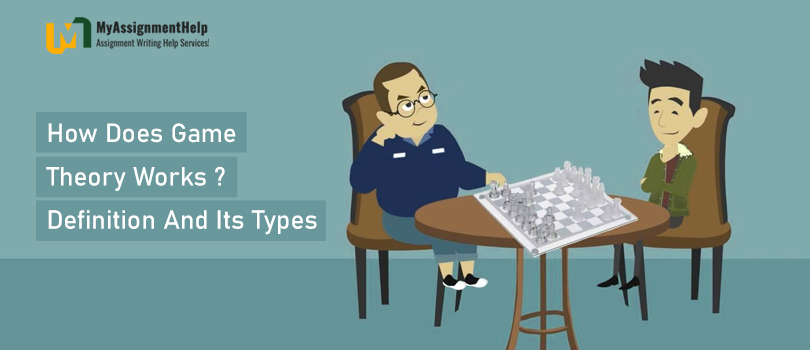A game theory framework describes what happens in social situations between competing players. Possibly, game theory is the science of strategy, or at least the art of making optimal decisions in strategic settings among independent and competing agents. To help you write the best assignment you can get Game Theory assignment help.

The Working of Game Theory
During the 1940s, John von Neumann and Oskar Morgenstern were the two most important pioneers of game theory. Nash is regarded as extending von Neumann and Morgenstern’s work in the field of mathematics in a significant way.
Games serve as a model for an adaptive situation between rational players, and thus are central to game theory. One of the core principles of game theory is that the outcome of one player depends on the strategy used by the other. In the game, players identify their identities, preferences, and available strategies, and how those strategies affect the result. There may be other assumptions or requirements depending on the model.
In addition to psychology and evolutionary biology, game theory has applications in politics, economics, and business. However, the science of game theory is still young and underdeveloped despite its many advances. Even in India you can get your assignment done by searching India Assignment Help on the internet from where you can get various platforms eager to help you with your assignment.
Key Points
- Based on game theory, competitive social situations in a strategic setting can be conceptualized and optimal decisions can be made by independent and competitive players.
- Game theory can be used to predict the outcomes of many real-world scenarios, including pricing competitions and product releases, among others.
- In addition to the prisoner’s dilemma, various other scenarios exist.
Definitions In Game Theory
Any circumstance in which there is a known payout or quantifiable consequence for two or more players, we can use game theory to help determine how it will unfold. Defining a few terms related to game theory is the first step.
- Game: The relationships between decision-makers (players) that have a determining effect on a particular result.
- Players: Those who make strategic decisions in a game.
- Strategy: It describes what a player will do based on any and all circumstances within the game that may arise
- Pay-off: Obtaining a particular outcome (the payout can be in dollars, utilities, or any other quantifiable form.)
- Information Set: At any given point in a game, a set of information is available. (This term is normally used when there is a sequential element.)
- Equilibrium: Having both players made their decisions and decided how to proceed in a game.
Types of Game Theory
Cooperative and non-cooperative game theories are the most common types of game theories, although there are many other types (e.g., symmetric/asymmetric, simultaneous/sequential, etc.). Combined game theory focuses on how cooperative groups, or coalitions, interact when only the payoffs are known. A coalition of players plays the game, rather than individuals, and it questions how groups form and how they distribute rewards. Economic agents need to deal with each other in a non-cooperative fashion to achieve their own goals. Most non-cooperative games are strategic games in which the available choices and the outcomes associated with them are listed. All these points are mentioned in Swansea Assignment Help in detail Rock-Paper-Scissors, for example, is a non-cooperative real-world game.
Why Should You Go With BookMyEssay?
BookMyEssay is the platform where professionals and experts are constantly trying to help the students in their academic studies and their academic career. The professionals have dedicated their lives in the betterment of the students and help them to tackle some uncommon and common problems that students face in their academic years.





